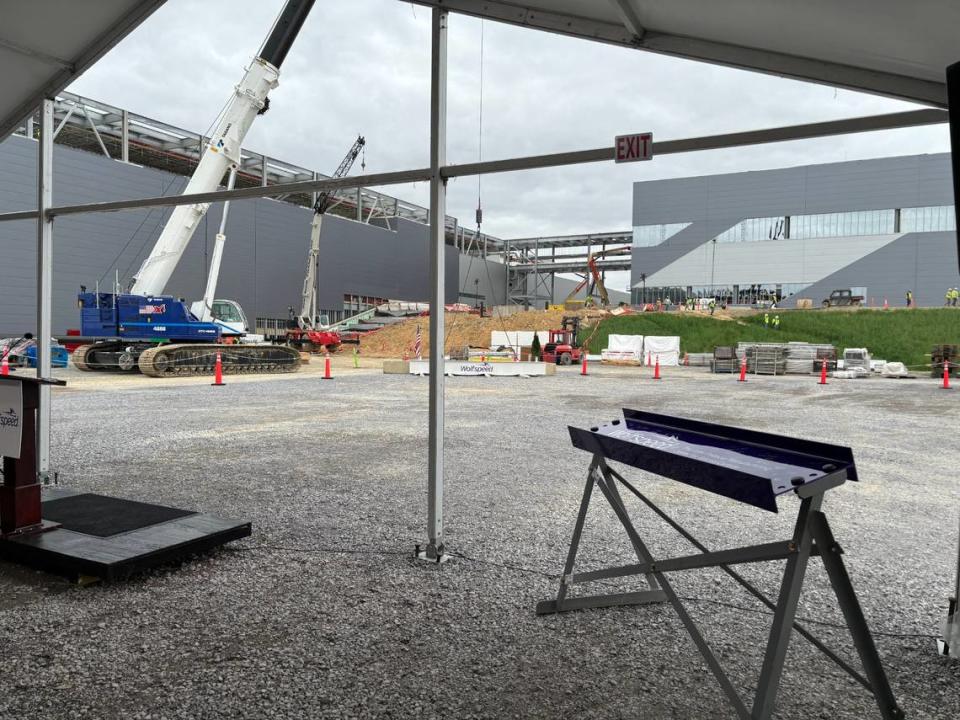NC chipmaker Wolfspeed lands federal CHIPS Act grant to support new Siler City factory
Durham semiconductor manufacturer Wolfspeed received long-anticipated backing Tuesday from the U.S. Department of Commerce to boost its domestic production of silicon chips.
A $750-million grant through the CHIPS and Science Act will support Wolfspeed’s incoming massive materials factory in Chatham County and its existing fabrication site in New York State.
Negotiations have progressed for months, with Wolfspeed CEO Gregg Lowe sharing in August that the company and government were working out “final terms.” Like all CHIPS Act grants, Wolfspeed’s award is non-binding and subject to the company reaching certain milestones. In a statement, the government said Wolfspeed must also “take additional steps to strengthen its balance sheet to better protect taxpayer funds.”
Wolfspeed announced Tuesday new private capital to “bolster” its balance sheet; a consortium of investment firms led by Apollo Global Management provided the chipmaker a loan worth another $750 million. The Commerce Department said Wolfspeed would not have received this financing without obtaining a CHIPS grant.
Combined, the $1.5 billion in new funding arrives as Wolfspeed aims to expand its North Carolina operations while easing liquidity concerns and reversing lowered investor expectations.
Formed in 1987 under the name Cree, Wolfspeed has pivoted in the past five years away from producing LED lights and toward exclusively making a unique semiconductor material called silicon carbide. What distinguishes silicon carbide from regular silicon chips is a chemical process called sublimation in which solids are converted into gases — and then back into solids. By avoiding the liquid phase, the semiconductor reduces electrical leakage and performs more efficiently.
Lowe told The News & Observer in an interview that silicon carbide, compared to traditional silicon, enables electric vehicles to go between 5% and 15% farther.
Wolfspeed has pioneered production of 200-millimeter substrates, or wafers, which are larger than the industry standard 150-millimeter size. Larger in diameter, these wafers yield more chips and present potential cost savings. Wolfspeed also makes 150-millimeter substrates, but the CHIPS funding is specific to the wider wafers the company has prioritized.
“The (CHIPS) grant will be made to help us produce 200-millimeter silicon carbide crystals and process those crystals into wafers, and then wafers into semiconductor chips,” Lowe said.

In September 2022, Wolfspeed announced it would construct a 200-millimeter materials factory in western Chatham County, on a megasite near Siler City. The company anticipated this massive facility would produce 10 times the silicon carbide currently produced at its existing 200-millimeter materials facility in Durham. Under a state economic incentive agreement, Wolfspeed committed to create more than 1,800 jobs and invest $5 billion at the future Chatham County plant.
A month before this North Carolina expansion announcement, President Joe Biden signed the CHIPS Act, which reserved $53 billion in grants for U.S. producers of semiconductors. The legislation also established an investment tax credit for eligible manufacturers to subsidize 25% of their project costs, through which Wolfspeed now expects to receive a federal tax credit worth around $1 billion.
Wolfspeed, headquartered just outside Research Triangle Park, has around 3,500 employees statewide. In June, the company finished constructing its 2-million-square-foot Siler City factory, which it named the John Palmour Manufacturing Center for Silicon Carbide after its late cofounder. Wolfspeed plans to begin shipping silicon carbide wafers from this site to its fabrication plant in New York State’s Mohawk Valley next summer.
“The project is on schedule, on budget,” Lowe said. “I personally pressed a button to start the first crystal growers. So, we’re already growing crystals in that facility.”
Wolfspeed delays and Wall Street woes
But as Wolfspeed readies its biggest North Carolina factory, the company has seen its stock price plummet.
Oct. 26, 2022 was the last day a share of Wolfspeed sold for more than $100. By the time President Biden visited its headquarters the following spring, the company’s stock had dropped to around $64. When the company topped off its massive materials factory near Siler City in March 2024, its share price stood at $28. And until this past week, investors have been able to purchase the stock for less than $10 a share.
Missed production deadlines, the rise of new competitors (including from China), softer sector demand, and concerns over Wolfspeed’s financial future have contributed to this fall. “Repeated delays from (Wolfspeed) have undoubtedly challenged the view of whether the company can provide customers supply assurance,” Morgan Stanley wrote in an August analyst note.

“We know that one area of investor concern has been our liquidity and capital structure and our ability to fund our long-term strategic plan,” Wolfspeed’s head of investor relations Tyler Gronbach said in an email last month to The N&O. “Which we are addressing through new funding, operating efficiencies and streamlining capital investment.”
In August, the company said it would close its 150-millimeter fabrication factory in Durham. Going forward, Wolfspeed is also looking at “additional potential areas to reduce costs and improve profitability across all aspects of the business,” Gronbach said.
Though not a cure-all, CHIPS Act dollars will benefit the company, analysts say.
“Make no mistake: securing CHIPS Act funding (estimated at potentially less than $1 billion) would be immensely helpful to Wolfspeed,” George Gianarikas, managing director of the investment bank Canaccord Genuity, said in a recent investor note. “Indeed, we believe the company is an excellent candidate for a grant, given its critical semiconductor technology in forward-looking industries and its U.S.-based manufacturing operations.”
Enjoy Triangle tech news? Subscribe to Open Source, The News & Observer's weekly newsletter, and look for it in your inbox every Friday morning. Sign up here.

 Yahoo Finance
Yahoo Finance 